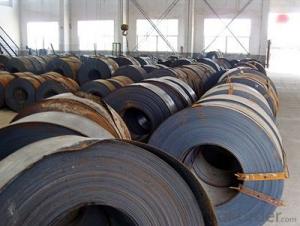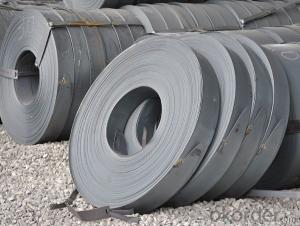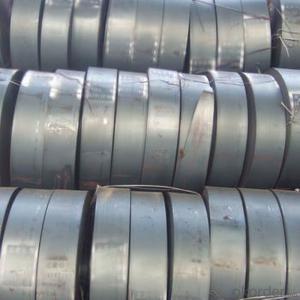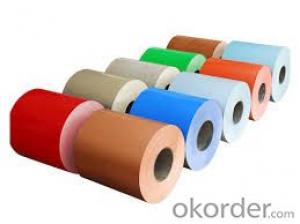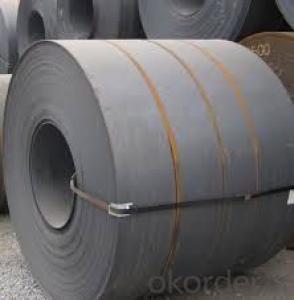SS400/Q235 Hot Rolled Steel Coil Strip high quality
- Loading Port:
- Tianjin
- Payment Terms:
- TT or LC
- Min Order Qty:
- 25 m.t.
- Supply Capability:
- 10000 m.t./month
OKorder Service Pledge
OKorder Financial Service
You Might Also Like
Hot Rolled Steel Coil / Strip
| Standard: | AISI,ASTM,BS,DIN,GB,JIS | Steel Grade: | SS400 Q235 Q345 SPHC |
| Thickness: | 1.8-15.5mm | Width: | 1000mm-2000mm |
| Application: | Construction | Surface Treatment: | Galvanized |
| Length: | in coil |
HOT-ROLLED COIL/PLATES(Material: SS400-Q235A/B-SPHC)
HOT-ROLLED COIL/PLATES(Material: SS400-Q235A/B-SPHC) | |||
2.00*1250/1500L | 3.50*1250/1500L | 5.75*1250/1500L | 11.50*1250/1500L |
2.30*1250/1500L | 3.75*1250/1500L | 7.50*1250/1500L | 11.75*1250/1500L |
2.50*1250/1500L | 4.50*1250/1500L | 7.75*1250/1500L | 13.50*1250/1500L |
2.75*1250/1500L | 4.75*1250/1500L | 9.50*1250/1500L | |
3.00*1250/1500L | 5.50*1250/1500L | 9.75*1250/1500L | |
PATTERN-ROLLED COIL/PLATES(Material: Q235A-Q235B)
PATTERN-ROLLED COIL/PLATES(Material: Q235A-Q235B) | |||
3.00*1250L | 3.75*1250L | 4.75*1250L | 5.75*1250L |
3.50*1250L | 4.50*1250L | 5.50*1250L | 7.50*1250L |
MIDDEL-PLATE(Material: Q235A/B-Q345A/B)
MIDDEL-PLATE(Material: Q235A/B-Q345A/B) | |||
8*1800/2000L | 16*1800/2000L | 25*1800/2000L | 45*1800/2000L |
10*1800/2000L | 18*1800/2000L | 30*1800/2000L | 50*1800/2000L |
12*1800/2000L | 20*1800/2000L | 35*1800/2000L | |
14*1800/2000L | 221800/2000L | 401800/2000L | |
Packaging & Delivery
| Packaging Detail: | in coil and load by bulk vessel or container |
| Delivery Detail: | within 30 days after deposit or original L/C |
- Q:How do steel coils contribute to energy efficiency in buildings?
- Steel coils contribute to energy efficiency in buildings in several ways. Firstly, steel coils are used in the construction of insulated panels and roofs, which provide effective thermal insulation. This insulation helps to reduce heat transfer, keeping the interior of the building cool in hot weather and warm in cold weather. Additionally, steel coils are often used in the manufacturing of energy-efficient windows and doors. These windows and doors are designed to minimize heat loss or gain, thereby reducing the need for heating or cooling systems and saving energy. Furthermore, steel coils are also utilized in the production of energy-efficient appliances, such as refrigerators and air conditioners, which consume less electricity while providing the same level of performance. Overall, the use of steel coils in building construction and appliances contributes to improved energy efficiency, reducing energy consumption and promoting sustainability.
- Q:How are steel coils used in the production of automotive wheels?
- Steel coils are used in the production of automotive wheels as the primary material for manufacturing the wheel rims. These coils are processed and formed into the desired shape, ensuring strength and durability for the wheels.
- Q:What are the dimensions of steel coils used in bridge construction?
- The dimensions of steel coils used in bridge construction can vary depending on the specific requirements of the project. However, typical dimensions for steel coils used in bridge construction range from 0.5 to 2 inches in thickness and 24 to 72 inches in width.
- Q:How are steel coils used in the production of steel clamps?
- Steel coils are used in the production of steel clamps as the primary raw material. The coils are fed into a machine that cuts, shapes, and bends them to create the desired clamp design. The strength and durability of the steel coils ensure that the resulting clamps are capable of securely holding objects together.
- Q:I'm looking for steel to make knives, but don't know what to get.
- Buying good knifes now-adays is very difficult as most steel is made abroad and the quality is not the same as it used to be, British steel made in Sheffield used to rule the world but alas no more! so basically you get what you pay for, so you must be prepared to part with a substantialal amount of your hard earnt cash to get the best.
- Q:I bought a stainless steel water bottle today. I really like it, but there is no drinking spout, it just has a lid that screws on and off, and an open hole to fill it and drink out of. Is this normal for these bottles? Or do they usually come with a spout to drink from? I don't want to look like an idiot at the gym drinking from this cool bottle with no spout if there's supposed to be one! haha.
- That's normal. I'm sure there are caps that you can get that have a built in spout though.
- Q:How do steel coils affect the quality of finished products?
- Steel coils can greatly impact the quality of finished products in various industries. One of the key ways steel coils affect product quality is through their dimensional accuracy and consistency. When the steel coils are not properly manufactured or have irregular dimensions, it can lead to issues in the production process and result in finished products that do not meet the desired specifications. Furthermore, the surface quality of steel coils is critical in determining the final appearance and performance of the finished products. Coils with surface defects, such as scratches, rust, or unevenness, can negatively impact the aesthetic appeal of the products, making them less desirable to customers. Moreover, these defects can also affect the functionality and durability of the finished products, leading to potential failures or reduced lifespan. The mechanical properties of steel coils also play a vital role in determining the quality of finished products. Coils with inconsistent or inadequate mechanical properties can compromise the strength, toughness, and overall performance of the end products. For example, in industries such as automotive or construction, where strength and reliability are crucial, the use of steel coils with the wrong mechanical properties can lead to safety hazards or structural failures. Additionally, the chemical composition of steel coils can significantly influence the quality of finished products. The presence of impurities or variations in the alloying elements can affect the material's corrosion resistance, weldability, and other essential properties. This, in turn, can impact the longevity and functionality of the final products. In summary, steel coils have a substantial impact on the quality of finished products. Their dimensional accuracy, surface quality, mechanical properties, and chemical composition all contribute to the overall performance, appearance, and durability of the end products. Therefore, it is crucial to ensure that steel coils used in manufacturing processes meet the desired standards to achieve high-quality finished products.
- Q:How are steel coils used in the production of storage systems?
- Steel coils are used in the production of storage systems as they are transformed into various components such as beams, columns, and shelves. These components are then assembled to create the framework and structure of the storage systems, providing strength, stability, and durability to store items efficiently.
- Q:Can steel coils be welded?
- Yes, steel coils can be welded. Welding is a widely used process for joining metal components, including steel coils.
- Q:How do steel coils impact the overall cost of production?
- Steel coils have a significant impact on the overall cost of production in a variety of industries. Firstly, the cost of steel coils themselves can be a significant expense. The price of steel is influenced by various factors such as supply and demand, raw material costs, and market fluctuations. Any increase in the cost of steel coils can directly impact the overall production cost, as it becomes a major component in the manufacturing process. Moreover, steel coils also affect the operational costs of production. They are typically used in various manufacturing processes, such as stamping, rolling, and forming, which require specialized machinery. The durability, quality, and size of the steel coils play a vital role in determining the efficiency and effectiveness of these processes. If the steel coils are of low quality or not suitable for the specific production requirements, it can lead to increased downtime, machinery maintenance, and rework, all of which contribute to higher production costs. In addition, transportation costs associated with steel coils can also impact the overall cost of production. Steel coils are usually heavy and bulky, necessitating special handling and transportation arrangements. The distance between the supplier and the production facility, as well as the mode of transportation, can significantly influence the logistics costs. Any increase in transportation expenses, such as fuel prices or shipping fees, can directly impact the overall cost of production. Lastly, the availability of steel coils can also impact production costs. In times of high demand or limited supply, the price of steel coils may increase, leading to higher production costs. Furthermore, if there is a shortage of steel coils due to factors like trade restrictions or disruptions in the supply chain, manufacturers may have to resort to alternative materials or sources, which could be more expensive or lower in quality. These factors can have a cascading effect on the overall cost of production. Overall, steel coils have a significant impact on the overall cost of production. Their cost, quality, transportation, and availability all influence the efficiency, effectiveness, and affordability of the manufacturing process. Therefore, manufacturers need to carefully consider and manage these factors to optimize their production costs and maintain competitiveness in their respective industries.
1. Manufacturer Overview |
|
|---|---|
| Location | |
| Year Established | |
| Annual Output Value | |
| Main Markets | |
| Company Certifications | |
2. Manufacturer Certificates |
|
|---|---|
| a) Certification Name | |
| Range | |
| Reference | |
| Validity Period | |
3. Manufacturer Capability |
|
|---|---|
| a)Trade Capacity | |
| Nearest Port | |
| Export Percentage | |
| No.of Employees in Trade Department | |
| Language Spoken: | |
| b)Factory Information | |
| Factory Size: | |
| No. of Production Lines | |
| Contract Manufacturing | |
| Product Price Range | |
Send your message to us
SS400/Q235 Hot Rolled Steel Coil Strip high quality
- Loading Port:
- Tianjin
- Payment Terms:
- TT or LC
- Min Order Qty:
- 25 m.t.
- Supply Capability:
- 10000 m.t./month
OKorder Service Pledge
OKorder Financial Service
Similar products
New products
Hot products
Hot Searches
Related keywords
